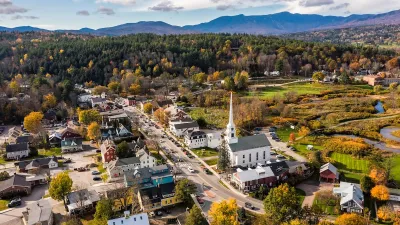Concerned about becoming a "western Detroit," the city of Reno, built around the gambling industry, seeks to shake off that trademark with new investments in other industries and amenities.
Like other cities built largely around a single industry, Reno has struggled to regain its footing during the United States' shaky recovery. As gambling-based tourism declined during the recession, so have Reno's fortunes. Many, like Bret Simmons of the University of Nevada, Reno, see gambling as unsustainable. "Those days are gone," he states. "Gaming is not the industry that's going to take us to the future." Now, as Micheline Maynard of the The Atlantic Cities writes, the "biggest little city in the world" is looking to change its debauched image to realign itself along more 'livable' principles.
With an unemployment rate of nearly 12%, Reno has began to embrace new sectors of the economy, ones that cater to both the many residents of Reno as well as the continuing flow of tourists to the Lake Tahoe region, in hopes of stimulating new economic growth. One such sector is that of the restaurant and entertainment trade, with the development of restaurants and bars showcasing local flavors and culture.
Additionally, like many other cities, Reno has also chosen to focus increasing attention on its university. Universities not only bring more people, and their money, into a community, but, more importantly, can also generate the high-quality research and technology-based jobs sought after by most cities.
Perhaps Reno resident and local chef Mark Estee speaks of the city's new vision best, stating, "It's a partnership of the whole city coming together. We want people to understand that Reno is more than just gaming."
FULL STORY: Reno Just Wants to Be Normal

Alabama: Trump Terminates Settlements for Black Communities Harmed By Raw Sewage
Trump deemed the landmark civil rights agreement “illegal DEI and environmental justice policy.”

Study: Maui’s Plan to Convert Vacation Rentals to Long-Term Housing Could Cause Nearly $1 Billion Economic Loss
The plan would reduce visitor accommodation by 25% resulting in 1,900 jobs lost.

Why Should We Subsidize Public Transportation?
Many public transit agencies face financial stress due to rising costs, declining fare revenue, and declining subsidies. Transit advocates must provide a strong business case for increasing public transit funding.

Wind Energy on the Rise Despite Federal Policy Reversal
The Trump administration is revoking federal support for renewable energy, but demand for new projects continues unabated.

Passengers Flock to Caltrain After Electrification
The new electric trains are running faster and more reliably, leading to strong ridership growth on the Bay Area rail system.

Texas Churches Rally Behind ‘Yes in God’s Back Yard’ Legislation
Religious leaders want the state to reduce zoning regulations to streamline leasing church-owned land to housing developers.
Urban Design for Planners 1: Software Tools
This six-course series explores essential urban design concepts using open source software and equips planners with the tools they need to participate fully in the urban design process.
Planning for Universal Design
Learn the tools for implementing Universal Design in planning regulations.
Caltrans
Smith Gee Studio
Institute for Housing and Urban Development Studies (IHS)
City of Grandview
Harvard GSD Executive Education
Toledo-Lucas County Plan Commissions
Salt Lake City
NYU Wagner Graduate School of Public Service




























